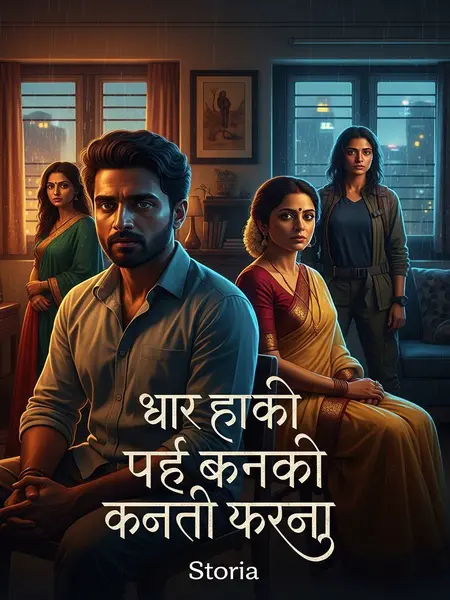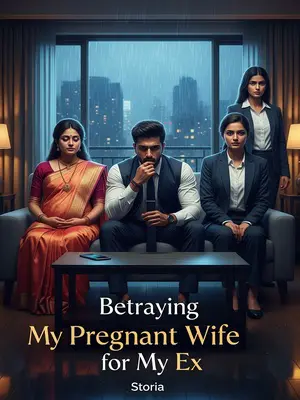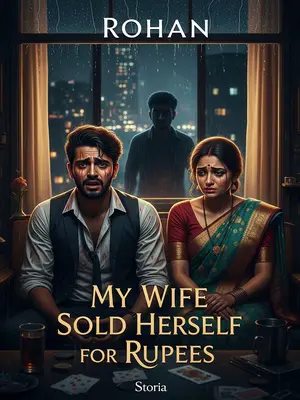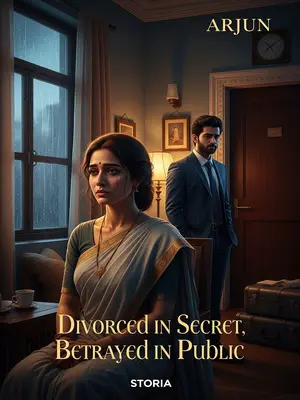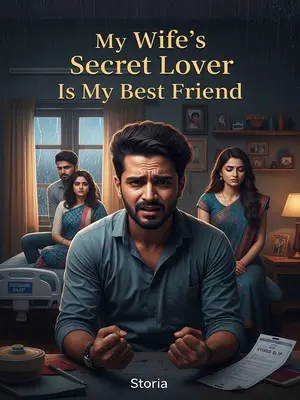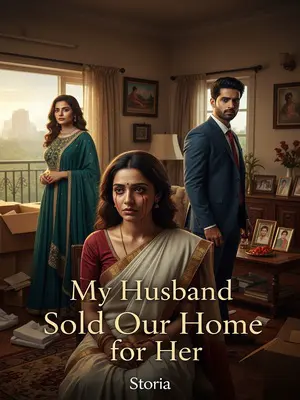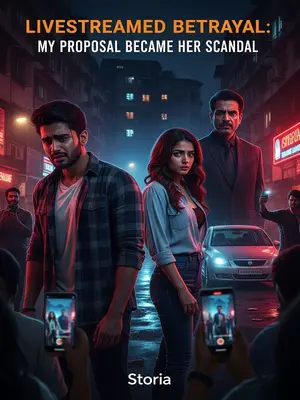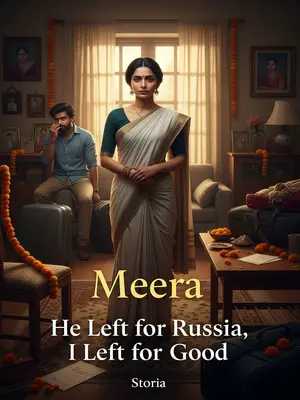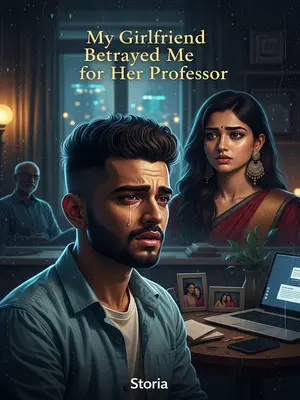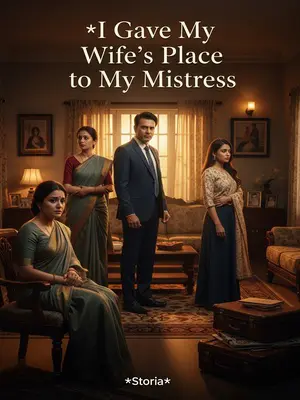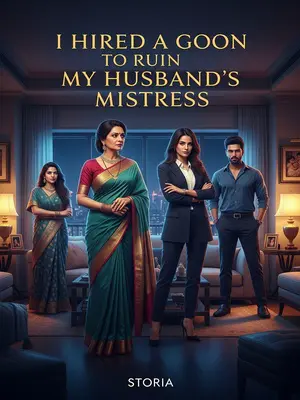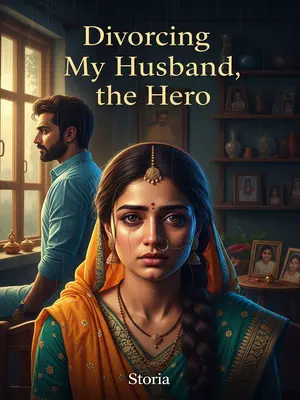Chapter 4: City Shadows
5
With complicated feelings, I left the town and went home.
The bus ride back was slow, every jolt and pothole jarring my thoughts. When I finally reached my flat, the silence inside pressed in from all sides.
The flat was still empty.
The dust on the windowsill, the stale air—everything spoke of absence. The neighbours’ TV played a rerun of an old saas-bahu serial, the kind my wife used to watch just to make fun of the overacting.
I never thought I’d betray my marriage one day.
Guilt burned in my chest, thick as the Mumbai humidity. I looked at the photo of us on the wall—me in a borrowed sherwani, her in a red silk saree, both of us grinning like fools.
My wife, Meera, and I were college classmates—the very model of campus romance; from any angle, we were enviable.
In college, people used to call us the perfect couple—her, the overachiever, me, the laid-back artist. We were the pair everyone invited to their parties, hoping our luck would rub off on them.
She was an all-round top student; I was a literary type.
She always had her nose in some management book or magazine, while I carried a notebook of half-finished lyrics and cheap pens.
She was the student council president; I was the band leader.
I remember how she’d run meetings like a CEO, while I played the guitar at the back of the auditorium, pretending not to watch her.
She wrote articles and often published them; I wrote songs and often performed.
Her name appeared in the college newsletter almost as often as mine did on the event posters. People teased us, saying we’d end up running a company together one day.
We got together—it was inevitable.
Our friends threw us a party, complete with cheap cake and off-key singing. The world felt like it belonged to us.
We married two years after graduation. Her career took off; after marriage, she was transferred overseas and quickly rose three levels, becoming an executive before thirty. She came home only three or four times a year, never for more than three days.
I used to count the days till her next visit, marking my calendar in red. Our calls became shorter, full of awkward silences. But her smile in photos never changed.
As for me, after several failed jobs, I simply became a househusband: occasionally performing, sometimes selling songs, sometimes teaching guitar.
I got used to the questions—"Beta, what do you do?"—and the way people’s eyes slid away when I said, “Househusband, mostly.”
Meera and I grew visibly further apart.
We became polite strangers, our conversations limited to grocery lists and reminders to pay the electricity bill.
This trek was an idea born of my boredom.
I told Meera I wanted to go trekking to clear my mind, and she immediately sent me fifty thousand rupees via UPI.
No questions, no fuss. Just a notification on my phone: “Fifty thousand credited.” A message: “Take care. Call when you reach.”
I can’t say if that makes me happy or just pathetic.
I stared at the bank message for a long time, wondering if this was love or just habit.
Thinking about it, I fell asleep on the sofa and dreamed of that night on the mountaintop—me and Ananya panting, when suddenly searchlights lit up all around, and Meera appeared before me, looking at me as if I was some useless naukar.
Her eyes in the dream were cold, unreadable. The searchlights hurt my eyes. I woke with a start, drenched in sweat.
I’ve let her down, and also our ten years together.
The old photos on the wall seemed to judge me. I averted my eyes, feeling smaller than ever.
I muddled through more than half a month, as usual, exchanging only a few words with Meera each day. She was always in meetings or at work dinners; we were like each other’s alarm clocks, only saying good morning and good night.
Our lives ran on parallel tracks, never quite touching. Sometimes I left her a message just to feel less alone.
I continued my househusband life. Another half month passed in a flash, and then I received a WhatsApp message from an unfamiliar number:
“I’ve arrived in Mumbai. Treat me to a meal.”
The message made my heart skip a beat. I stared at the number, my mind racing.
I was inexplicably excited. I didn’t recognise the number, but I was sure it was her.
I felt like a teenager again—heart pounding, palms sweaty, rehearsing a hundred greetings in my head.
Without much hesitation, I replied:
“Where?”
I tried to keep it cool, but my thumb hovered over the screen, waiting.
She replied instantly: “Indigo Bar, 6 p.m.”
The message felt electric. I grinned to myself, catching my reflection in the TV screen—hair a mess, eyes shining.
The moment I received the text, I felt as if electricity was running through my body—numb and tingling.
I changed my shirt three times, splashed on a bit of perfume, checked my wallet for cash. The mirror showed an older face, but something boyish had returned to my smile.
6
On the way, I imagined a thousand ways to greet her.
The city’s evening traffic was merciless; I cursed every red light. My mind ran wild with possibilities—should I act casual? Should I try to impress her with a joke? Or just play it cool?
I couldn’t let her see how much I missed her, but I didn’t want to seem indifferent either. Should I show her a bit more charm? With a nervous heart, I pushed open the private room door. As soon as the door opened halfway, I saw her.
There she was, unmistakable, sitting with the kind of careless poise only city girls manage. The room smelled of expensive perfume and fried snacks.
She had cut her hair short, slightly curled and draped over her shoulders, with huge pink earrings hanging from her ears, brushing her collarbone and shoulder straps.
Her new look was bold, modern—like someone who’d left the mountains behind and dived into Mumbai nightlife without missing a beat.
A strapless camisole, an ultra-short leather skirt, her calves wrapped in long boots—she was simply a sexy queen.
My jaw dropped. I felt underdressed in my checked shirt and faded jeans, but she wore her confidence like armour.
I entered, about to speak, but my mood instantly plummeted.
Beside her sat a man—young, sharp-featured, and built like he belonged in a sports magazine. They were close—too close.
A man was sitting close to her, very young, with a handsome face and a strong build.
He had the kind of smile that made people listen, and she was laughing at something he’d said.
Ananya leaned her head close to his mouth; he was saying something, and she laughed heartily.
It was a full-throated laugh, not the polite giggle she gave strangers. I felt a pang of jealousy.
At that moment, I didn’t know whether I should stand there or not.
For a second, I considered turning around, pretending I’d walked into the wrong room. My heart hammered in my chest.
“You’re here?” Ananya saw me, as if I were an old classmate she hadn’t seen in years.
She waved me over, cool as ever. No drama, no blushes.
“Let me introduce you: this is Kabir, someone I met during the trek. This is Allen, a… good friend.”
She lingered on the word ‘friend’ just long enough to sting. The other man—Allen—looked up, sizing me up.
Allen stood up and reached out to me, speaking in awkward Hindi: “Hello, I’m Allen.”
His accent was unmistakably foreign, the kind you hear at five-star hotels or on Bandra’s Carter Road.
“A foreign friend?” I asked.
My surprise was genuine, but I tried not to let it show. Ananya smiled, as if enjoying my discomfort.
“Sorry, my Hindi isn’t very good. I work at OAP, came to India for training.”
He grinned, proud of his efforts. OAP—the same company Meera worked for. My mind whirled.
I was stunned—OAP was Meera’s company.
The coincidence hit me like a slap. I forced a grin, hoping nobody saw my hand clench under the table. The ground felt like it was shifting under my feet.
I smiled and said, “I know OAP, a famous overseas group. I heard the executives are all young.”
Allen perked up, eager to share gossip. “Yes, yes, our youngest VP isn’t even 30, and she’s a beautiful woman.”
He must be talking about Meera. I quickly pretended to be interested and asked, “That legendary? Have you met her? What kind of beauty is she?”
I leaned in, pretending to be a fan. My stomach churned with dread and pride.
Allen gave a thumbs up and said seriously, “She really is beautiful, but that’s not the most important thing. President Meera is the most perfect professional woman I’ve ever seen. She’s professional, dedicated, humble, and sincere to everyone. I can say that every man who’s met President Meera is captivated by her.”
His voice was almost reverent. For a moment, I hated him for knowing my wife better than I did.
I clicked my tongue in admiration, but my heart was in turmoil.
All the old wounds—my failure, her success—opened up afresh. I felt like shrinking into the wall.
I knew Meera was perfect, but hearing another man praise her—especially after I’d just secretly betrayed her—made me feel awful.
I wanted to shout, to defend myself, but all I could do was nod and smile.
“There are still a few friends who haven’t arrived. Have a seat first.” Ananya pointed to the corner, then went back to sticking close to Allen. The two of them held hands, their thighs touching, and when they spoke their mouths were almost touching.
Every gesture was calculated, meant to sting. I clenched my fists under the table, trying not to stare.
I felt ridiculous.
Here I was, pining for a woman who’d moved on without a backward glance.
I couldn’t forget a one-night stand, while to her it meant nothing.
My heart ached with the realisation—maybe I was the only one who’d carried that night with him.
If that’s the case, why did she ask me here? Was I just a prop?
My mind ran circles, chasing meaning in her every word, every glance.
I sat in a daze, lost in thought. At some point, Ananya sat next to me.
Her perfume hit me first, sweet and heady. She leaned close, her eyes glinting with mischief.
“Did you miss me?” she breathed into my ear again.
Her voice was so soft, I felt her words on my skin more than in my ears.
I glanced at Allen; he was playing on his phone, seemingly unconcerned.
He scrolled through Instagram, oblivious to our whispered conversation.
Could it be that everyone Ananya invited today had once had a passionate fling with her… just another plaything?
The thought made my cheeks burn. Maybe I was just another entry in a long list.
“Say something—did you miss me?” She looked at me mischievously and smiled.
Her smile dared me to answer honestly, to drop all my defences.
I threw caution to the wind.
For once, I decided to be honest—even if it made me look foolish.
“I’m sure I’m not the only one who misses you, right?”
I tried to sound nonchalant, but my voice cracked.
“Jealous?”
She grinned, enjoying the game.
“Yeah, I’m jealous. Since you have a new flame, why did you ask me here?”
My voice was sharper than intended, but I didn’t care.
“Want to know?” Ananya picked up a beer from the table. “Drink this and I’ll take you somewhere nice.”
She raised her eyebrows, the challenge clear. The old rules didn’t apply to her; she made her own.
I took the beer and downed it in one go.
The bitterness burned my throat, but I welcomed it. She clapped, impressed.
“Impressive.” Ananya suddenly kissed me on the cheek, then pulled me out and upstairs to the second floor.
Her lips were soft, lingering for a second longer than necessary. She grabbed my hand and led me up the stairs, weaving through the noisy crowd like it was the most natural thing in the world.
The second floor was a karaoke lounge; it wasn’t singing time yet, so it was dark and quiet.
The sofa creaked under us, and the flickering disco lights painted her face blue and pink. The silence was thick, broken only by the distant thump of a Bollywood remix. She walked quickly, heels clicking on the tiles.
Ananya dragged me down the hallway to the very end and pushed open a private room.
The room smelled of cheap air freshener and stale cigarette smoke. The sofa was lumpy, but the darkness made it feel intimate.
After closing the door, she threw herself into my arms, almost trembling as she said, “Kiss me.”
Her urgency shocked me—her hands cold, her breath hot against my neck. In that moment, the world faded away.
---
[End of Chapter 4: In the city, every shadow is cast by something you can’t outrun.]
